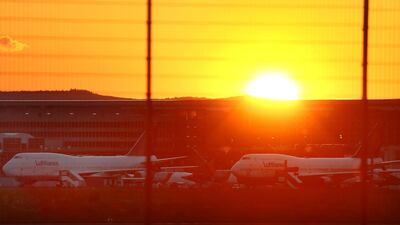Germany threw Lufthansa a €9 billion (Dh36.03bn/$9.81bn) lifeline on Monday, agreeing to a bailout that gives Berlin a veto in any hostile bid for the airline.
The largest German corporate rescue since the coronavirus crisis began will give the government a 20 per cent stake, which could rise to 25 per cent in the event of a takeover attempt, as it seeks to protect thousands of jobs.
Lufthansa has been locked in talks with Berlin for weeks over aid it needs to survive an expected long travel slump, with the airline wrangling over how much control to give up in return for financial support.
Germany's government has spent decades offloading stakes in companies, but remains a large shareholder in former state monopolies such as Deutsche Post and Deutsche Telekom.
And Berlin still has a 15 per cent holding in Commerzbank, which it took on during the global financial crisis.
Other airlines including Air France-KLM and US carriers American, United and Delta airlines have also sought state aid after the coronavirus hit global travel.
Germany's Finance and Economy ministries said on Monday that Lufthansa, the shares of which closed up 7.5 per cent at €8.64, had been operationally healthy and profitable with good prospects, but ran into trouble with the pandemic.
"The support that we're preparing here is for a limited period," Finance Minister Olaf Scholz said of the deal, under which Germany is buying new shares at the nominal value of €2.56 each for a total of about €300 million.
Berlin, which has set up a €100bn fund to take stakes in companies struck by the coronavirus crisis, said it planned to sell the Lufthansa stake by the end of 2023.
"When the company is fit again, the state will sell its stake and hopefully with a small profit that puts us into a position to finance the many, many requirements that we have to meet now, not only at this company," Mr Scholz said.
Conditions of the deal include the waiver of future dividend payments and limits on management pay, Lufthansa said.
It said the government would also hold two seats on its supervisory board, with one becoming a member of the audit committee.
Under the bailout package, the government will also inject €5.7bn in non-voting capital, known as a silent participation.
Part of this could be converted into an extra 5 per cent equity stake, to protect Lufthansa against a hostile takeover or in case coupon payments of 4 per cent in 2020 and 2021, increasing to 9.5 per cent by 2027, are missed by the airline.
"This will prevent Lufthansa from being sold out," Economy Minister Peter Altmaier said.
Mr Altmaier said would help to save thousands of jobs but did not include any extra environmental conditions.
Lufthansa will also receive a €3bn, three-year loan from state-backed KfW and private banks.
The state's WSF rescue fund plans to refrain from exercising voting rights at regular shareholder meetings under the bailout deal, which still requires approval by shareholders and the European Commission, Lufthansa said.
Mr Altmaier declined to give details about the remaining sticking points in negotiations with the European Commission, but said he was convinced that Brussels would give approval to the bailout.
"We liaised with Brussels on all big rescue packages with which we avoided millions of unemployed and prevented a lot of companies from bankruptcy," he told ARD TV.
"They were all approved at the end, so this gives me hope that we'll also find a solution in this case."
Germany is still discussing with Europe's competition watchdog which airport slots it will have to give up to ensure the bailout does not hamper competition, a source said.
"Scrutiny is extremely thorough as it is the first large equity-based bailout in the pandemic," the source said.
German newspaper Handelsblatt reported that Chancellor Angela Merkel told fellow conservatives in a closed-door meeting on Monday that Berlin would fight to ensure remedies were not too stringent.

